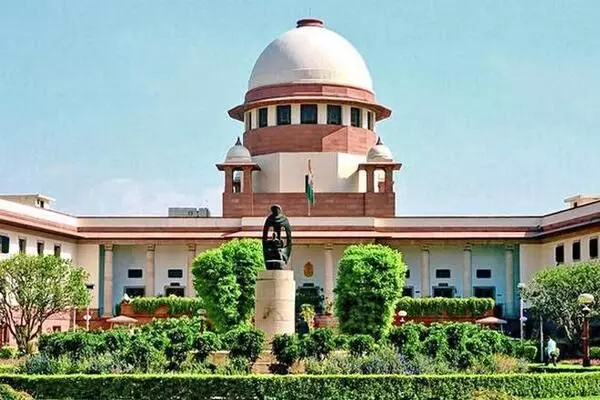
Two judgements from Supreme Court
text_fieldsThe Supreme Court of India was once again wielding the stick after the Centre refused to heed the SC's instructions from last May. The court said that if the government honours all factors that the government should consider in constitutional decisions and conforms to legal criteria, the government can avert judicial interventions. The apex court has come out with two noteworthy verdicts in the last two days criticising the lackadaisical approach of the Centre towards tackling the pandemic. First is the order which affirms that food and other basic needs are covered under Article 21 or Right to Life. Second is the verdict that directs the government to compensate the dependents of those who died of Covid-19 under the Disaster Management Act. The apex court slammed the lax approach of the Centre in resolving the basic problems of the public, particularly the poor, in the face of the Covid pandemic in both the verdicts.
The pathetic images of migrant and unorganized workers having to walk back to their hometowns in the lockdown during the initial days of the pandemic had shocked the nation. It was only then that these workers and their hardships which had been invisible until then, found a place in 'mainstream' narrative and attracted the specific attention of the courts. Despite the existence of laws such as the Unorganised Workers' Social Security Act, 2008 and Inter-State Migrant Workmen (Regulation of Employment and Conditions of Service) Act, 1979, and the government agencies bound to enforce them, none of them had precise statistics about the labourers. The Supreme Court order that a database of migrant workers be organised and registered lay ignored in the Ministry of Labour until the beginning of the pandemic. For this criminal negligence by the state, the innumerable workers who died of starvation during their walk back home had to pay a heavy price.
On May 24th and June 11 this year, the Supreme Court asked the Centre once again to speed up the data collection. However, the Centre responded with the evasive excuse that that it wouldn't be that easy to do. And that was what prompted the court to set July 31 as the deadline for all states to implement the One Nation One Ration Card scheme. The labour ministry's neglect towards workers is unpardonable. By July 31, the Centre should start the online portal for migrant and unorganised workers to register online. The Supreme Court's criticism was that the delay in starting this is evidence for their lack of concern. The Centre has the responsibility to both respond to this criticism and to ensure that migrant labourers are fed during the pandemic by immediately starting community kitchens.
Though the Centre declared the Covid pandemic a national disaster, the Union Government is not ready to provide the cover of the Disaster Management Act to the public. The verdict which declares that the dependents of those who died by Covid-19 have a right to compensation also reveals the ironies of those in power. Solicitor General Tushar Mehta's arguments that the Centre is not liable to pay compensation under the 12th section of the Disaster Management Act clearly implies that the government does not even wish to fulfil the promises the prime minister made in his address to the nation. The court fully rejected this argument of the SG, and judged that the National Disaster Management Authority (NDMA), headed by the PM, had failed their constitutional responsibilities. The court has also set a six-week deadline for the NDMA to fix the criteria for determining the compensation amount. The Supreme Court underlined that the lax attitude of the Centre towards grassroots problems of the public during the pandemic has created grievous repercussions. However, even the interventions of the Supreme Court would only be useful such laws are put in place by which the `government and officials are penalised if they fail to meet the basic needs of the public. The two judgements by the court indicate that an overhaul of our system and mechanisms is inevitable to address the issues faced by the poor.





